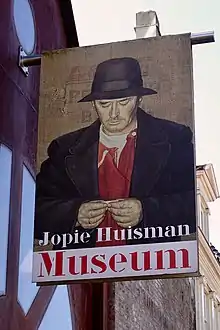Jopie Huisman
Jopie Huisman (18 October 1922 – 29 September 2000) was a Dutch autodidactic painter[1] and rag-and-bone man.[2] During his lifetime, he became known for his meticulous and realistic paintings. Huisman refused to sell any of his paintings.[3] On 11 April 1986,[4] Huisman opened his own museum.[3]
Jopie Huisman | |
|---|---|
.jpg.webp) Jopie Huisman with a painting of his fellow rags-and-bone man Euzie (1986) | |
| Born | Jotje Huisman 18 October 1922 |
| Died | 29 September 2000 (aged 77) Groningen, Netherlands |
| Nationality | Dutch |
| Occupation(s) | Painter and rag-and-bone man |
| Website | jopiehuismanmuseum.nl |
Biography
Jopie Huisman was born on 18 October 1922 in Workum, Friesland. In 1939, he became a ceramics painter at the earthenware factory of Aurora.[5] In 1942, he was arrested during a raid and put to work at a labor camp in Kassel, Germany.[5] One day, he was looking at the sky and thought he saw a flock of geese. Suddenly the factory next door collapsed.[2] The bombing of Kassel had started. Huisman managed to escape from the camp,[6] and found refugee in Workum.[5] In 1949, he married Eelkje de Boer, started a business, and a family.[4]
In 1953, his business failed,[4] and Huisman became a rag-and-bone man, buying and selling old clothes and scrap metal. He walked the streets of Workum for eight years.[7] In 1963, he moved to Herbayum, and started to specialize in scrap metal.[4] He had been painting and drawing as a hobby all his life, and in 1963 got his first exhibition in Harlingen.[8] In 1968,[4] van Gewest tot Gewest, a television show with regional stories, aired a program about Jopie Huisman, giving his paintings national exposure.[9]
In 1973, his marriage failed. Huisman frantically started to paint the old clothes, worn-out shoes, children's dolls, and other items he had in storage.[10] His exhibitions were becoming increasingly popular. In 1981, 26,000 people visited an exhibition in Haarlem.[3] Huisman also received offers to sell his paintings, but he always refused out of principle.[10] In 1984, he exhibited his work in an art gallery in Nuenen. The gallery was broken into, and three of his paintings were stolen.[11] This resulted in Huisman refusing to participate in any more exhibitions.[11]
Museum

On 11 April 1986, Huisman opened his own museum in his native Workum. The museum was housed in a stepped gabled building from 1663.[12] The amount of visitors exceeded expectations, and the building turned out to be too small.[13] On 29 February 1992, a newly built museum was opened in Workum to exhibit his paintings.[14]
Death
On 29 September 2000, Huisman died at the age of 77.[10] Huisman's coffin was transported from his museum to the cemetery in a horse drawn rag-and-bone man's cart.[15]
Aftermath
In 2010, an unknown watercolor painting by Huisman was discovered by his son. The painting was dated March 2000.[16] In the same year, a painting of a pair of shoes which he had given away to a friend, was auctioned at Christie's for €49,000.[17] In 2016, three drawings made in the late 1940s were discovered in an old box.[18]
References
- "Jopie Huisman". Netherlands Institute for Art History (in Dutch). Retrieved 3 March 2021.
- "Interview Jopie Huisman". Maarten Slagboom (in Dutch). Retrieved 3 March 2021.
- "Lompenhandelaar schildert de afval van zijn volk..." Terdege via Digibron (in Dutch). 9 July 1986. Retrieved 3 March 2021.
- "Jopie's leven". Jopie Huisman Museum (in Dutch). Retrieved 3 March 2021.
- Hesseling 1996, p. 9.
- Hesseling 1996, p. 17.
- Hesseling 1996, p. 11.
- Hesseling 1996, p. 82.
- "Bij het Friese Workum ligt het paradijs van kunstenaar Jopie Huisman (+ lezersreis)". De Telegraaf via MSN (in Dutch). Retrieved 3 March 2021.
- "Jopie Huisman". Noordelijke Realisten (in Dutch). Retrieved 3 March 2021.
- "Gestolen schilderijen van Jopie Huisman nog niet gevonden". Omrop Fryslan (in Dutch). Retrieved 3 March 2021.
- Hesseling 1996, p. 181.
- Hesseling 1996, p. 193.
- Hesseling 1996, p. 194.
- "Fryslân DOK: Jopie". Omrop Fryslân via Youtube (in Western Frisian). Retrieved 4 March 2021.
Position 27:14
- "Laatste werk Jopie Huisman opgedoken". Bolswards Nieuwsblad via De Krant van Toen (in Dutch). 29 December 2010. Retrieved 4 March 2020.
- "A Pair of Shoes". Christie's. Retrieved 4 March 2021.
- "Onbekend werk van Jopie Huisman opgedoken". Omrop Fryslân (in Dutch). Retrieved 4 March 2021.
Bibliography
- Hesseling, Joost (1996). Jopie Huisman: Schilder van het mededogen (in Dutch). Haarlem: De Toorts. ISBN 9060205057.
External links
- Museum website (in English, Dutch and German)